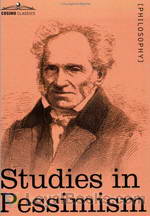|
Books Should Be Free Loyal Books Free Public Domain Audiobooks & eBook Downloads |
|
|
Books Should Be Free Loyal Books Free Public Domain Audiobooks & eBook Downloads |
|
Author Collection |
|---|
By: Arthur Schopenhauer (1788-1860) | |
|---|---|
 Studies in Pessimism
Studies in Pessimism
Arthur Schopenhauer, an early 19th century philosopher, made significant contributions to metaphysics, ethics, and aesthetics. His work also informed theories of evolution and psychology, largely through his theory of the will to power – a concept which Nietzsche famously adopted and developed. Despite this, he is today, as he was during his life, overshadowed by his contemporary, Hegel. Schopenhauer’s social/psychological views, put forth in this work and in others, are directly derived from his metaphysics, which was strongly influenced by Eastern thought... | |
 The Art of Controversy (or The Art of Being Right)
The Art of Controversy (or The Art of Being Right)
The Art of Controversy (or The Art of Being Right) (Die Kunst, Recht zu Behalten) is a short treatise written in 1831 by the German philosopher Arthur Schopenhauer in which he presents thirty-eight methods of gaining an unfair advantage in a debate and thereby being right even if you are wrong. Schopenhauer champions the virtue of dialectical argument, in his view wrongly neglected by philosophers in favour of logic, and goes on to discuss the distinction between our conscious intellectual powers and our will. The text is a favourite of debaters including the philosophers AC Grayling and Mary Warnock, and the Mayor of London Boris Johnson. | |
 (German) Über die Weiber
(German) Über die Weiber
In diesem vielzitierten Essay aus dem Jahre 1851 ist Schopenhauers generell herablassende Einstellung zu Frauen zusammengefaßt. Frauen, laut Schopenhauer, sind Wesen zweiter Klasse mit weniger Vernunft als Maenner, und sind biologisch zu List und Intrige getrieben… Schopenhauers dominante Mutter Johanna, eine bekannte Schriftstellerin, wird oft als Ursache für die Frauenfeindlichkeit ihres Sohns genannt.(Zusammenfassung von Gesine) | |